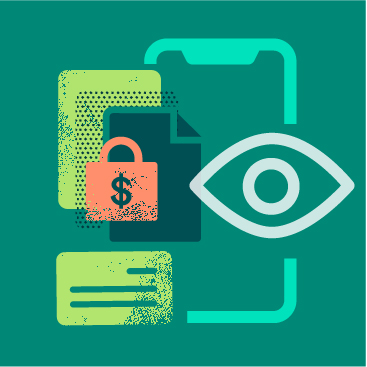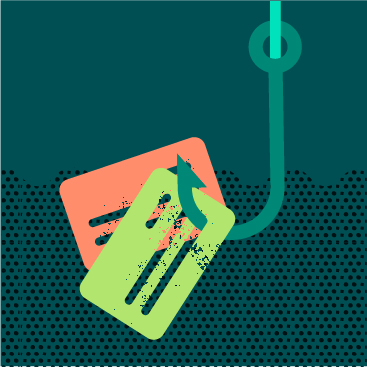10 ways to avoid college scams
December 20, 2022 • 15 minute read
As you work on earning your college degree in order to build a stronger future, you’re likely navigating new situations. From applying for scholarships to searching for an apartment, every step brings you closer to realizing your dreams; however, you may also be at an increased risk of being targeted by college scams.
To avoid getting taken for a ride, learn to spot the signs of scammers. Here are 10 ways to spot scammers’ siren songs and keep your identity, money and sense of trust intact:

1. Never pay for access to scholarships or grants.
As you search for scholarships and grants for college, you may encounter some scholarship scams. These scams may be in the form of marketing emails or ads on social media, and they often promise a large sum of money for college, as long as you abide by certain terms.
A hallmark of these fraudulent offers is that the scammers typically want money from students before providing them with the promised scholarship and grant applications. Other scholarship scams may be in the form of invitations to in-person workshops where bad actors coerce students through high-pressure sales tactics.
Either way, the scammer’s goal is to walk away with your personal information and money while giving you nothing in return. Be wary of paying for access to scholarship and grant opportunities no matter what’s promised. To ensure an opportunity is legitimate, do your research before applying or before attending a workshop, and contact your college tuition or bursar’s office for confirmation.
2. Be on the lookout for online college scams.
With more colleges embracing remote learning, online college scams are on the rise. These scams prey on students’ busy lifestyles and their ambitions for the next stage in their lives: making the big bucks.
While it may be tempting to enroll in one of these get-your-diploma-quick online colleges, they usually lack proper coursework and exams and, ultimately, do not have the accreditation that potential employers will be looking for when hiring candidates. So, while you may walk away with a quick diploma, it will be one that carries no value.
You may be able to spot these scams by knowing what to look for. Avoid online colleges that have created names that are very similar to legitimate colleges and universities and ones that promise an ultra-fast transition from enrollment to graduation. Use extreme caution when an institution offers a college degree or diploma for a flat fee.
Even if a school claims to be accredited, there are just as many illegitimate accrediting agencies out there. So be sure to find out whether the school’s accrediting agency is recognized by the Council for Higher Education Accreditation (CHEA) and the U.S. Department of Education.
3. Buy your textbooks from reputable sellers.
New college students are often surprised by the high price of college textbooks, some costing over $200 each. Unless your professor or course requires digital access codes for your reading materials, buying used textbooks may be a good way to save money. However, you may first want to educate yourself about textbook scams.
These scammers often set up fake websites to sell physical and digital textbook copies. The sites may have names that mirror well-known, reputable sites, making it easy to mistake them for legitimate booksellers. After a buyer makes a purchase, the scammers never send the textbooks, and there’s no recourse for a refund. To avoid this scam, you may want to consider purchasing books only through your school bookstore, an established publishing company or a trusted online bookstore.

4. Confirm late tuition notifications with your school.
As if the process of applying and enrolling for college weren’t already stressful enough, some colleges require that tuition be paid in full within just a few days of the start of the semester. If the tuition isn’t paid on time, the college may drop you from your classes for nonpayment. After agonizing over which classes to take and jumping through many hoops to enroll, this outcome may sound like a nightmare.
Scammers take advantage of that fear with the late tuition scam, in which they call students to tell them their college tuition payment is overdue. The scammers then take on the hero role by informing the alarmed students that they can pay the balance immediately over the phone, at which point the scammers walk away with the money.
This scam may be more difficult to detect, as scammers can spoof the phone number they’re calling from to make it appear like one belonging to your college or university. Fortunately, this scam can be avoided by simply hanging up. If you’re targeted by one of these scams, you may want to let your college administrative office know about it, and, if you’re concerned about your tuition payment, contact your institution directly to inquire whether you have a tuition balance due.
5. See apartments in person before paying deposits or fees.
Unless you plan to live in a dorm, chances are you’ll be searching for an apartment. Scammers prey on the annual influx of students shopping for apartments by putting up fake rental listings.
With these scams, scammers try to trick students who are inexperienced in the rental market into paying a deposit to hold an apartment without ever seeing it. In other cases, they may ask students to put up a portion of the rent to reserve the apartment or pay a fee to schedule a showing.
To avoid these scams, first, be leery of rental listings that seem too good to be true. For example, apartment scams often advertise an ultra-low rental price or extremely favorable terms. If possible, visit the apartment leasing office in person to confirm the terms and fill out an application or pay fees if you’re interested in the apartment. Second, if you’ve applied for the apartment, be sure to get a copy of the rental terms and ask for receipts for any payments for things such as your background check, deposit or rent.

6. Keep your personal and financial info private.
In general, to avoid college scams and identity theft, keep your personal and financial information private and secure by heeding the following best practices:
- Don’t carry your Social Security card in your wallet.
- Keep your sensitive documents in a locked file cabinet or safe.
- Store your digital documents in an encrypted file vault.
- Shred your personal mail before throwing it away.
- Opt for direct deposit paychecks instead of paper checks.
- Wipe your hard drive before selling or donating used electronic devices.
- Perform a factory reset on mobile devices before trading or recycling them.
In addition, avoid giving out your personal and financial information to people you don’t know, especially if it’s an unsolicited request.
7. Be wary of unsolicited credit card offers.
Credit cards may help you build your credit, and a higher credit score may be helpful when it comes to getting a job, buying a home and securing low insurance premiums. However, you may want to ignore random credit card offers that flood your inbox, especially if they are unsolicited offers.
Many credit card scams begin with an invitation to apply via email, social media post or a letter. After an unsuspecting applicant has filled out the credit card application with their personal details, the scammer then uses this information for identity theft or other fraudulent activities.
Credit card scams may also come in the guise of invitations to apply for legitimate credit cards, but with very unfavorable terms, such as exorbitant interest rates or fees, potentially landing you in an endless cycle of debt.
To help avoid these situations, either visit the financial institution where you’re considering obtaining a credit card in person, or make sure you are visiting the card issuer’s legitimate website. Ensure any website where you’re entering your personal information is secured. If you’re not sure whether a credit card offer is legitimate, contact the issuer directly to confirm.
8. Watch out for job listings that seem too good to be true.
Because college coursework is typically quite time consuming, opportunities for earning money may be hard to come by. Knowing this, scammers often target college students who are looking for flexible employment. Beware of job listings that boast high pay, flexible hours and other excellent terms. These may be signs of an employment scam.
These scammers may provide job seekers with an application, interview, job offer and onboarding process, all to make it appear like a real job. Then, after the supposed new employee provides their banking information for payroll direct deposit, the scammers disappear, draining their victims’ accounts.
To protect yourself from employment scams, make sure the company is credible before applying. You can also search online using the terms, “scam + [company name]” to see what comes up.
9. Skip the public Wi-Fi when possible.
As course deadlines loom, you may be tempted to work on-the-go by popping into cafes with public Wi-Fi networks. While convenient, scammers can exploit security flaws in these networks, potentially allowing them to tap into a treasure trove of your personal information.
Another public Wi-Fi scam that scammers employ is creating fake hotspots next to real ones, which then allows them to access data from your laptop, phone or other electronic device. From there, it’s easy for scammers to gain your personal information and potentially access your bank accounts or steal your identity.

If you must use public Wi-Fi, consider limiting your online activity to class-related information, such as research or writing papers. Avoid accessing your bank account, making purchases or logging into password-protected accounts.
10. Review your credit report on a regular basis.
All too often, people realize too late that they’ve become a victim of identity theft. A common scenario when applying for a new job or a loan for a new car or house, people discover their credit has been ruined by someone who has stolen their identity. By regularly checking your credit report, you have a better chance of spotting fraudulent attempts to open new accounts in your name, including credit cards, rental agreements and bank accounts. Spotting these signs early may allow you to minimize any further damage.
To aid in regularly reviewing credit, federal law entitles you to one free copy of your credit report every 12 months from each of the three nationwide credit reporting companies, Transunion, Equifax and Experian. Fortunately, you can obtain an annual report from each of the three major credit reporting bureaus at AnnualCreditReport.com. Once you’ve obtained your reports, compare them with your records to make sure no one is using your name and personal information to obtain credit.
What should you do if you’ve fallen victim to a scam?
Despite your best efforts to avoid college scams, you may find you’ve become a victim. If so, to minimize the damage, immediately take the following steps:
- Collect as much information as possible about the scammer and halt all contact with them.
- Report the fraud to your bank, credit card company or other applicable financial institution.
- File an official fraud report with the Federal Trade Commission.
- Notify the Washington State Office of the Attorney General about the scam.
- Submit a fraud report through the Better Business Bureau Scam Tracker.
- Freeze your credit to prevent the scammers from using your identity.
After completing these steps, keep a close eye on your credit report so that you can dispute any fraudulent items you may find. Beyond that, stay well-informed about new scams on the horizon. Scammers try to stay one step ahead by creating new ways to steal people’s identities and money. To help avoid becoming a victim, educate yourself on scammers’ tactics and be leery of college-related offers that seem too good to be true.
Not sure where to start when it comes to managing your money?
Not sure where to start when it comes to managing your money?
Get answers, not judgment. WSECU offers pro advice to help you grow your financial future.
